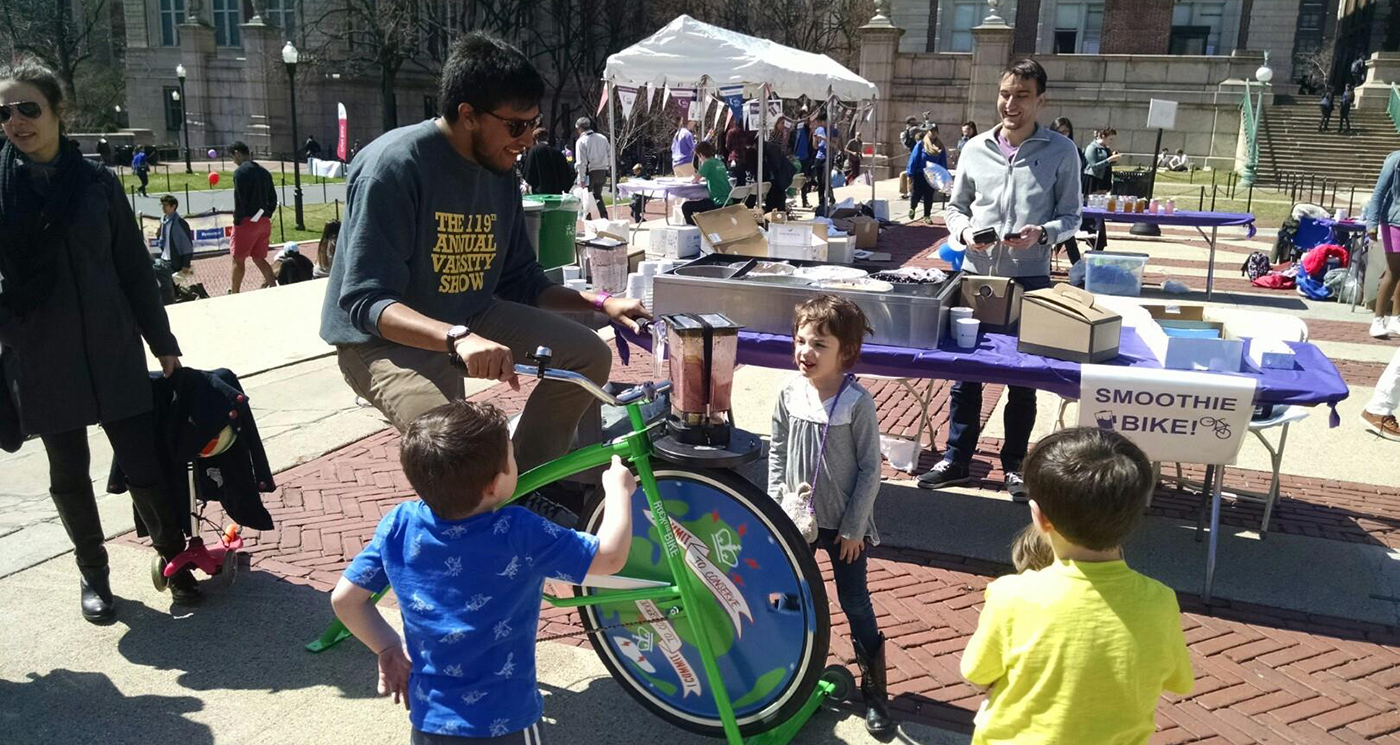
Creating a “Living Lab” to Improve Campus Sustainability
Green continued to be the new Columbia blue in FY 2015. The Office of Environmental Stewardship led several initiatives that created a “living lab,” where students, faculty and staff work together to brainstorm ideas, test concepts and implement new programs to advance sustainability on campus.
The University Green Fund encourages students to propose sustainability innovations through a competition where winning concepts are awarded funding between $5,000 and $10,000 each to test their ideas. This year’s project teams include Break the Ice, aimed at reducing energy use in laboratory freezers used for long-term storage of biological samples; Sustain-a-Bottle which is designed to reduce plastic bottle use through education, behavior modification and installation of water bottle filling stations; and SIPA Zero Waste which is collecting data through waste audits to evaluate the viability of composting collection in an academic building and support the need for further recycling education.
In a collaboration with the Earth Institute’s sustainable development undergraduate capstone program, students were challenged to problem solve strategies to improve waste management practices in Lerner Hall. The capstone group observed user behavior and conducted an audit of signage and bins. As a result, Facilities and Operations is implementing many of the team’s conclusions, including more consistent signage around waste receptacles to reduce confusion when sorting and adding recycling bins in more heavily trafficked areas in Lerner Hall.
Altering commuting preferences is one of the campus’s most challenging yet environmentally impactful sustainability objectives, when considering the nearly 50,000 students, faculty and staff who need to get to, from and between our campuses each day. Environmental Stewardship piloted new programs to encourage carpooling and increased promotion of bicycle-riding benefits – all intended to reduce the number of people driving to campus. A new program encouraged Manhattanville construction workers to use Carma, a carpooling app on smartphones that makes it easier to make carpooling matches and share commuting costs. Promotion increased for bicycling and the many amenities Columbia offers, such as discounts at local bike shops, free bicycle registration, bicycle parking, free workshops on bicycle maintenance and safety skills and regular Bike to Campus days which feature free bike tune-ups and the recent launch of a bike share pilot. Columbia was recently named both a Bike Friendly Campus and a Bike Friendly Business by the League of American Bicyclists.
Sustainability innovation continued in FY 2015 when Columbia became the first urban university to implement a composting pilot program with the New York City Department of Sanitation. Food scraps and food-soiled paper – collectively called organics – are collected at John Jay Dining Hall (over 3,000 pounds per week) as well as several faculty and graduate student apartment buildings and picked up by the city for composting, transforming the waste into a useful product that improves the quality of soil for street trees, gardens, urban farming and more as well as decreasing trash sent to the landfill. Other campus composting initiatives include “The Rocket,” a student-run composter in the basement of Ruggles Hall, and organics collection at the local Columbia University Greenmarket.
These efforts – just some of the initiatives to build a healthier, more sustainable Columbia – are not going unnoticed. In the past year, Columbia was awarded a Gold rating from the 2015 AASHE Sustainability Tracking Assessment and Rating System (STARS) Report and recognized as one of America’s Greenest Universities by both The Princeton Review and bestcolleges.com.
The Office of Environmental Stewardship and its partners continue to work closely with colleagues across the University to identify new ideas and test new initiatives – our vibrant living laboratory for practicing sustainability.

